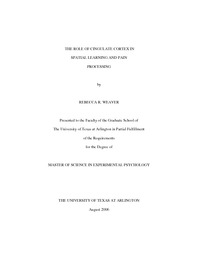
ATTENTION: The works hosted here are being migrated to a new repository that will consolidate resources, improve discoverability, and better show UTA's research impact on the global community. We will update authors as the migration progresses. Please see MavMatrix for more information.
Show simple item record
| dc.contributor.author | Weaver, Rebecca | en_US |
| dc.date.accessioned | 2007-08-23T01:55:56Z | |
| dc.date.available | 2007-08-23T01:55:56Z | |
| dc.date.issued | 2007-08-23T01:55:56Z | |
| dc.date.submitted | August 2006 | en_US |
| dc.identifier.other | DISS-1448 | en_US |
| dc.identifier.uri | http://hdl.handle.net/10106/34 | |
| dc.description.abstract | Research implicates the Anterior Cingulate Cortex (ACC) mediates the affective component of pain processing but not spatial learning. The Posterior Cingulate Cortex (PCC) mediates spatial learning but not pain processes. This study investigated the roles of each cortex in spatial learning and pain processing. Lesions were made using standard stereotaxic procedures on 96 animals. Inflammatory condition was induced via carageenan. Animals were randomly assigned between both MPWT and PEAP followed by Morris Swim Test or vice versa in order to prevent an order effect. As hypothesized, ACC lesioned animals resulted in no spatial learning decrement, but showed no avoidance behavior in PEAP within the inflammatory condition. PCC lesioned animals resulted in no spatial learning decrement and showed no significant avoidance behavior in PEAP which goes against the hypotheses. | en_US |
| dc.description.sponsorship | Fuchs, Perry N. | en_US |
| dc.language.iso | EN | en_US |
| dc.publisher | Psychology | en_US |
| dc.title | The Role Of Cingulate Cortex In Spatial Learning And Pain Processing | en_US |
| dc.type | M.S. | en_US |
| dc.contributor.committeeChair | Fuchs, Perry N. | en_US |
| dc.degree.department | Psychology | en_US |
| dc.degree.discipline | Psychology | en_US |
| dc.degree.grantor | University of Texas at Arlington | en_US |
| dc.degree.level | masters | en_US |
| dc.degree.name | M.S. | en_US |
| dc.identifier.externalLink | https://www.uta.edu/ra/real/editprofile.php?onlyview=1&pid=16 | |
| dc.identifier.externalLinkDescription | Link to Research Profiles | |
Files in this item
- Name:
- umi-uta-1448.pdf
- Size:
- 165.7Kb
- Format:
- PDF
This item appears in the following Collection(s)
Show simple item record


